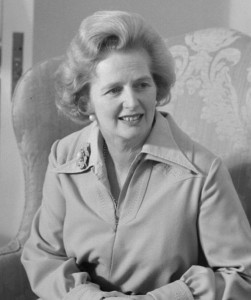The legacy of the Iron Lady
Following Baroness Thatcher’s death on 8 April 2013, a torrent of debates on her influence as Prime Minister resurfaced, providing the backdrop to a peaceful memorial.
The opinions that have risen ranged from David Cameron calling her a “Great Briton” to the continued ‘blame’ for her role in the destruction of jobs and increased poverty. This has even extended to a musical battle with “Ding dong the Witch is dead” and “I am in love with Margaret Thatcher” competing to be at the top of the musical charts. As celebrations were held at the news of her death, what exactly were the policies that caused such controversy?
Thatcher started her career in politics in 1959 when she was elected Member of Parliament (MP) and then in the 1979 general election she became the first and only woman prime minister of the UK.
During her term in office, the Iron Lady introduced a series of political and economic initiatives intended to bring about a golden age. Together with the Chancellor of the Exchequer Geoffrey Howe, she set about lowering direct taxes on income, whilst keeping indirect taxes high. This, alongside a reduced level of inflation, led to an overall GDP increase of 23 percent.
Her push for privatisation of nationalised industries (e.g. British steel) caused a marked improvement in performance, particularly through increased labour productivity, further benefiting consumers through lower prices and improved efficiency.
Arguably her biggest success, however, was her win in the Falklands War, which secured her a second term as Prime Minister. The controversial decision to go to war was eventually hailed as a success, boosting much of the country’s morale.
Yet, her death was celebrated. The decision she made whilst in power affected the lives of many to the point where they wanted her dead.
Her focus on reducing the power and influence of trade unions led to the devastating loss of jobs for many of those given hope by their union membership. Limits were put on when they could go on strike, there was privatisation of state-owned companies, and mine closures. The distaste of her policies presented itself in the 1981 riots. And despite this, she was able to bring about a resurgence of support with the Falklands War, resulting in her re-election in 1983.
Suffering only increased further as government spending on social housing was decreased by 67 percent during her term of office. Reductions in expenditure on social services, education, housing and cuts in higher education all resulted in her being the first Oxford-educated post-war Prime Minister not to be awarded an honorary doctorate by the University of Oxford. She was even infamously known as the “Milk Snatcher” when she abolished free milk to children from seven- to 11-years old.
Overall, like any Prime Minister, Margaret Thatcher pushed for many policies, which were both beneficial and painful, which she stuck by.
The economic growth and the Falklands War were her greatest successes, which caused her to last in office from 1979 to 1990 despite the fact that many suffered from the loss of jobs and housing.
Many of her policies were bold; she was equally loved and hated in the UK but she was also respected by many foreign officials. Whether respected or abhorred, her mark on history has certainly been left and she truly deserves her name as the Iron Lady.

Comments